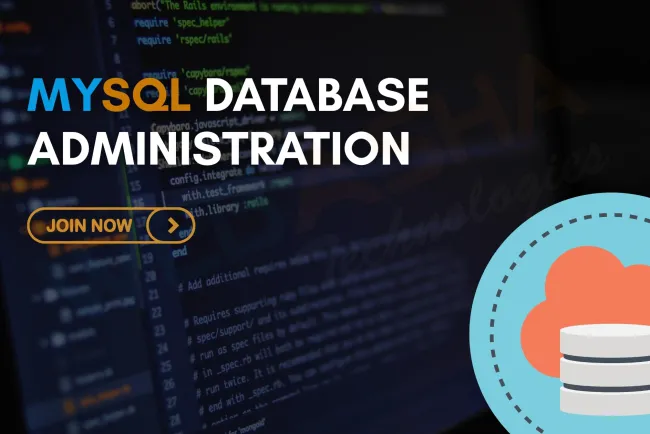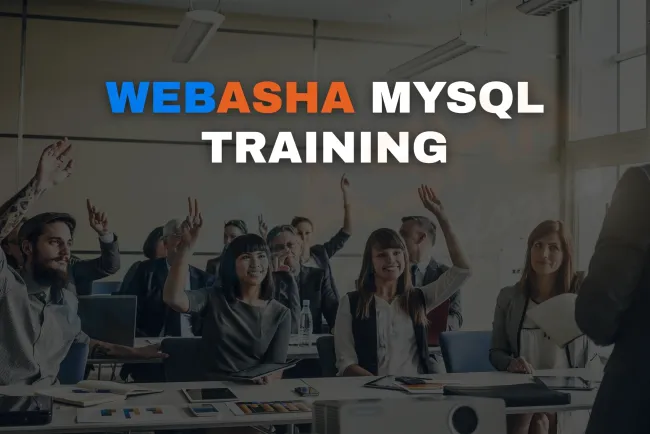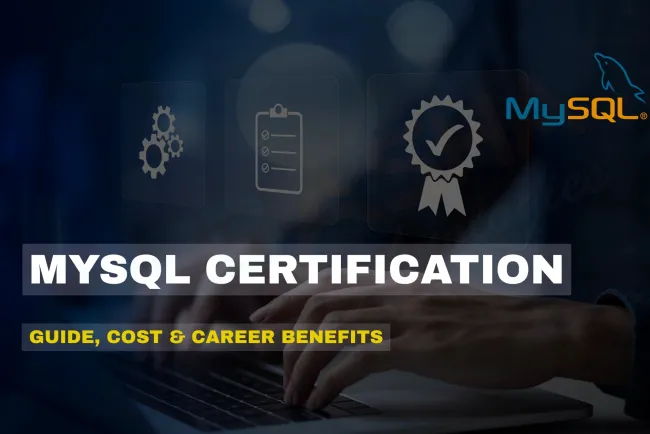MySQL Course for Beginners | Learn SQL, Databases, and Querying from Scratch in 2025
Looking to learn SQL and data handling? This MySQL Course for Beginners offers a complete introduction to relational databases, queries, CRUD operations, and MySQL tools like Workbench and phpMyAdmin. Whether you're a student, aspiring analyst, or web developer, this course builds a solid foundation to start your data journey. Learn MySQL basics with practical skills that prepare you for real-world jobs in 2025.

Table of Contents
- Why Learn MySQL in 2025?
- What is a MySQL Course for Beginners?
- What Will You Learn in a MySQL Beginner Course?
- Who Should Take a Beginner MySQL Course?
- Benefits of Taking a MySQL Beginner Course
- Skills You’ll Gain from a MySQL Course
- Job Roles After Completing a MySQL Course
- Tips to Get the Most Out of a MySQL Course
- Common Mistakes Beginners Should Avoid
- Conclusion
- Frequently Asked Questions (FAQs)
In today’s data-driven world, learning MySQL is one of the smartest moves for anyone entering the tech industry. Whether you're a student, aspiring data analyst, or web developer, a MySQL course for beginners offers a solid foundation in handling databases, executing queries, and analyzing data using Structured Query Language (SQL). This blog will guide you through everything you need to know before starting your MySQL learning journey.
Why Learn MySQL in 2025?
MySQL is an open-source relational database management system that powers millions of websites and enterprise applications globally. It’s fast, reliable, and compatible with major programming languages like Python, PHP, Java, and Node.js. Learning MySQL opens doors to a wide range of career opportunities in data science, backend development, and system administration.
Key Reasons to Learn MySQL:
-
High demand in data-driven roles
-
Easy to learn for beginners
-
Strong community and documentation
-
Powering platforms like Facebook, YouTube, WordPress
-
Free and open-source
What is a MySQL Course for Beginners?
A MySQL course for beginners is a structured learning program that introduces students to database fundamentals, SQL commands, and MySQL tools. It focuses on teaching real-world skills such as creating databases, running queries, and managing data efficiently.
Core Features of Beginner MySQL Courses
| Feature | Description |
|---|---|
| Level | Designed for beginners with no prior SQL or coding experience |
| Topics Covered | SQL basics, database design, CRUD operations, joins, functions |
| Tools Used | MySQL Workbench, phpMyAdmin, XAMPP |
| Mode of Learning | Online, classroom, hybrid |
| Project Work | Includes hands-on mini-projects and real-time database tasks |
| Certification | Offers a certificate of completion or prepares for Oracle exams |
What Will You Learn in a MySQL Beginner Course?
1. Introduction to Databases
Understand how databases work, what relational databases are, and how MySQL fits in.
2. Installing MySQL & Tools
Learn how to install MySQL Server, set up MySQL Workbench, and use phpMyAdmin.
3. SQL Syntax and Data Types
Master basic SQL syntax, keywords, data types, and best practices.
4. CRUD Operations
Practice Create, Read, Update, Delete (CRUD) operations for managing data in tables.
5. Table Relationships and Joins
Explore one-to-many and many-to-many relationships and use INNER JOIN, LEFT JOIN effectively.
6. Filtering and Sorting
Use WHERE, ORDER BY, and LIMIT clauses to extract precise data.
7. Aggregate Functions
Work with SUM, AVG, COUNT, MAX, MIN for data analysis.
8. Views, Indexes, and Constraints
Learn about performance optimization, data validation, and simplifying queries.
9. MySQL Functions
Use built-in string, numeric, and date functions in queries.
10. Backup and Security Basics
Understand user privileges, data backups, and restoring databases.
Who Should Take a Beginner MySQL Course?
-
College students aiming to learn databases
-
Aspiring data analysts and scientists
-
Backend developers or full-stack learners
-
Working professionals looking to upskill
-
Business analysts and managers dealing with data reports
Benefits of Taking a MySQL Beginner Course
✅ No Coding Required Initially
Most beginner courses focus on SQL commands, not programming.
✅ Foundation for Advanced Learning
Once you're comfortable, you can move to advanced MySQL, PL/SQL, or PostgreSQL.
✅ Applicable to Real-World Jobs
Skills learned can directly apply to data entry, analysis, and development roles.
✅ Saves Time with Structured Learning
Instead of scattered tutorials, you get a step-by-step curriculum.
Skills You’ll Gain from a MySQL Course
-
Database Design & Modeling
-
Efficient SQL Query Writing
-
Normalization & Relationships
-
Data Integrity & Validation
-
Error Handling in Queries
-
Data Aggregation & Reporting
Job Roles After Completing a MySQL Course
| Role | Average Salary (INR) |
|---|---|
| SQL Developer | ₹3 LPA – ₹6 LPA |
| Database Administrator | ₹5 LPA – ₹9 LPA |
| Data Analyst | ₹4 LPA – ₹8 LPA |
| Web Developer | ₹3 LPA – ₹7 LPA |
| Business Intelligence Exec | ₹6 LPA – ₹10 LPA |
Tips to Get the Most Out of a MySQL Course
-
Practice Daily: Build small databases and write real queries.
-
Use Tools: Work with MySQL Workbench and phpMyAdmin for hands-on experience.
-
Join Forums: Engage in MySQL communities on Reddit, Stack Overflow, and GitHub.
-
Apply Concepts: Use your skills in mini-projects like inventory systems or blogging platforms.
-
Study Real Data: Try querying open datasets like COVID-19 stats or eCommerce products.
Common Mistakes Beginners Should Avoid
-
Memorizing queries instead of understanding logic
-
Ignoring data types and constraints
-
Not practicing JOINs and nested queries
-
Skipping normalization steps
-
Forgetting to back up databases during practice
Conclusion: Is a MySQL Course Worth It for Beginners?
Yes, 100%. A MySQL course for beginners is one of the best entry points into tech and data-related careers. It's practical, accessible, and widely applicable across roles and industries. With growing demand for data skills, learning MySQL in 2025 not only builds your confidence but also strengthens your resume for long-term success.
FAQs
What is a MySQL course for beginners?
A MySQL course for beginners is a training program that teaches the basics of databases, SQL queries, data manipulation, and MySQL tools to newcomers without prior experience.
Who should take a beginner MySQL course?
Students, data analysts, web developers, and professionals looking to understand databases should consider taking a MySQL beginner course.
Is MySQL easy to learn for beginners?
Yes, MySQL is beginner-friendly, with simple syntax and tools like MySQL Workbench and phpMyAdmin that make learning easier.
How long does it take to complete a beginner MySQL course?
A beginner MySQL course typically takes 4 to 8 weeks, depending on the pace and depth of the curriculum.
Do I need programming knowledge to learn MySQL?
No, programming knowledge is not required. Basic computer skills are enough to start learning MySQL.
What topics are covered in a beginner MySQL course?
Courses typically cover database basics, SQL commands, joins, filtering, sorting, aggregate functions, and tools like MySQL Workbench.
Is there a certification for MySQL beginners?
Yes, many courses offer a certificate of completion or help prepare for official MySQL certifications like Oracle Certified MySQL Associate.
Can I get a job after learning MySQL?
Yes, SQL and MySQL are in-demand skills in roles like data analyst, database administrator, and backend developer.
Which tools are used in MySQL courses?
Courses often include tools such as MySQL Workbench, phpMyAdmin, and XAMPP.
Are MySQL skills useful for data analysis?
Absolutely. MySQL is commonly used to store, retrieve, and analyze data, making it a crucial skill for data analysts.
What is the best way to practice MySQL?
The best way is to set up a local server, work on sample projects, and run queries on test datasets.
How is MySQL different from SQL?
SQL is the language, and MySQL is a database system that uses SQL to interact with data.
Can I learn MySQL online for free?
Yes, there are free tutorials and resources available, though structured courses offer better support and hands-on practice.
Does MySQL support big data applications?
While MySQL handles moderate data loads well, it's not optimized for big data applications like Hadoop or NoSQL systems.
What is CRUD in MySQL?
CRUD stands for Create, Read, Update, Delete—the four basic functions for managing database records.
What is a JOIN in MySQL?
A JOIN is used to combine rows from two or more tables based on a related column between them.
How can I secure my MySQL database?
By setting up user privileges, using SSL, and regularly backing up your database, you can secure your MySQL setup.
What are MySQL functions?
They are built-in operations like SUM(), COUNT(), NOW() that help with calculations and formatting within queries.
Can I use MySQL with Python or Java?
Yes, MySQL integrates easily with Python, Java, PHP, and other programming languages through connectors.
What is normalization in MySQL?
Normalization is the process of structuring data to reduce redundancy and improve data integrity.
Does MySQL support mobile app development?
Yes, MySQL can be used as a backend for mobile applications using APIs or backend frameworks.
What is MySQL Workbench?
MySQL Workbench is a GUI tool that helps users visually design, manage, and run MySQL queries and databases.
Can I host MySQL databases online?
Yes, many platforms like AWS, Azure, and shared hosting providers offer MySQL database hosting.
What is the difference between MySQL and PostgreSQL?
MySQL is faster for read-heavy operations, while PostgreSQL supports advanced features and complex queries better.
Is MySQL good for eCommerce websites?
Yes, MySQL is widely used for eCommerce platforms like Magento, WordPress, and WooCommerce.
Can I build projects in a MySQL course?
Yes, beginner courses often include mini-projects like employee records, inventory systems, or student databases.
What are data types in MySQL?
Common data types include INT, VARCHAR, DATE, FLOAT, BOOLEAN, etc., used to define column values.
How does indexing work in MySQL?
Indexing speeds up query performance by allowing the database to find rows more efficiently.
What is phpMyAdmin used for?
phpMyAdmin is a web-based tool that allows you to manage MySQL databases visually through a browser.
Will learning MySQL help me in interviews?
Yes, SQL-based questions are very common in technical interviews, especially for roles involving data.











![Top 10 Ethical Hackers in the World [2025]](https://www.webasha.com/blog/uploads/images/202408/image_100x75_66c2f983c207b.webp)



![[2025] Top 100+ VAPT Interview Questions and Answers](https://www.webasha.com/blog/uploads/images/image_100x75_6512b1e4b64f7.jpg)







